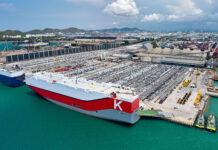
CMA CGM is about to surpass Mediterranean Shipping Company as the largest intra-Mediterranean operator, according to Alphaliner.
The French carrier has increased the number of ships and currently deploys much larger vessels in the Mediterranean compared to a year ago. Currently, CMA CGM operates 60 ships of over 96,000 TEUs in the intra-Mediterranean market, after adding six more vessels this year. The average size of CMA CGM’s deployed fleet has gone up to 1,677 TEU this year, from 1,433 TEU last year.
At present, the Marseille-based box line has a market share of 19.9% in the intra-Mediterranean, just behind MSC’s 22%. Alphaliner observed that CMA CGM is bucking a trend of carriers reducing their intra-Mediterranean exposure. MSC’s market share is down from 24% in 2022, while Maersk Line’s has decreased to 11% from 15% in 2022, after the Danish operator cut more than 10,000 TEUs from the intra-Mediterranean market.
With its new Greece-Turkey-Libya, Turkey-Libya and Greece-Turkey-Poti loops, CMA CGM has launched three new intra-Mediterranean services which have added 11,000 TEUs of capacity.
Alphaliner noted that CMA CGM historically has a strong presence in services to/from North Africa, especially in the Maghreb states (Morocco, Algeria, Tunisia, Libya). The French line deploys a staggering 87.3% of its total intra-Mediterranean capacity in services calling to at least one Maghreb port. Compared to a year ago, CMA CGM has increased its capacity to the Maghreb by 40.4%.
Mainline operators still dominate the Mediterranean short-sea segment, with a combined market share of 66%, leaving 34% for regional carriers and common feeder operators. However, compared to a year ago, the major players have lost 5% of their market share, mainly as Maersk and ZIM Line removed a considerable amount of capacity from the market.
ZIM, which in 2022 registered a market share of 3.8%, has seen its share drop to 2.2% in the past twelve months leaving the carrier in eighth place (a drop of two rankings), ahead of Turkish short-sea carrier Akkon Lines. The Haifa-based carrier has reduced its intra-European capacity by a staggering 69.1% or 5,000 TEU in just one year. Most notably, it has significantly reduced the average ship size of its Israel-Turkey TBX loop from 3,143 TEU to just 1,984 TEU and closed its Turkey-Egypt TEX loop.
Martina Li
Asia Correspondent





